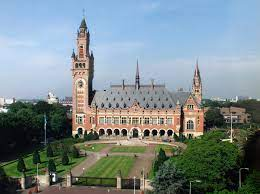CURRENT AFFAIRS
Get the most updated and recent current affair content on Padhaikaro.com
International Court of Justice (ICJ)
- IAS NEXT, Lucknow
- 11, Feb 2022

Reference News:-
Delivering its judgement, the International Court of Justice (ICJ) has awarded the DRC $225 million for damage to persons, which includes loss of life, rape, recruitment of child soldiers and displacement of civilians.
- Now, Uganda must pay the Democratic Republic of the Congo (DRC) $325 million in reparations related to the brutal conflict between the two nations from 1998 to 2003.
What’s the issue?
The DRC initially filed the case with the ICJ in June 1999, citing acts of armed aggression perpetrated by Uganda on its territory “in flagrant violation of the United Nations Charter and of the Charter of the Organization of African Unity.”
- At the height of the war, more than nine African countries were drawn into the fighting.
- The Court ruled in December 2005 that Uganda had to make reparation to the DRC, but the sides could not reach agreement.
About ICJ:
- ICJ was established in 1945 by the United Nations charter and started working in April 1946.
- It is the principal judicial organ of the United Nations, situated at the Peace Palace in The Hague (Netherlands).
- Unlike the six principal organs of the United Nations, it is the only one not located in New York (USA).
- It settles legal disputes between States and gives advisory opinions in accordance with international law, on legal questions referred to it by authorized United Nations organs and specialized agencies.
Structure:
- The Court is composed of 15 judges, who are elected for terms of office of nine years by the United Nations General Assembly and the Security Council. These organs vote simultaneously but separately.
- In order to be elected, a candidate must receive an absolute majority of the votes in both bodies.
- In order to ensure a measure of continuity, one third of the Court is elected every three years and Judges are eligible for re-election.
- ICJ is assisted by a Registry, its administrative organ. Its official languages are English and French.
The 15 judges of the Court are distributed in following regions:
- Three from Africa.
- Two from Latin America and Caribbean.
- Three from Asia.
- Five from Western Europe and other states.
- Two from Eastern Europe.
Independence of judges:
Unlike other organs of international organizations, the Court is not composed of representatives of governments. Members of the Court are independent judges whose first task, before taking up their duties, is to make a solemn declaration in open court that they will exercise their powers impartially and conscientiously.
Jurisdiction and Functioning:
- ICJ acts as a world court with two fold jurisdiction i.e. legal disputes between States submitted to it by them (contentious cases) and requests for advisory opinions on legal questions referred to it by United Nations organs and specialized agencies (advisory proceedings).
- Only States which are members of the United Nations and which have become parties to the Statute of the Court or which have accepted its jurisdiction under certain conditions, are parties to contentious cases.
- The judgment is final, binding on the parties to a case and without appeal (at the most it may be subject to interpretation or, upon the discovery of a new fact, revision).